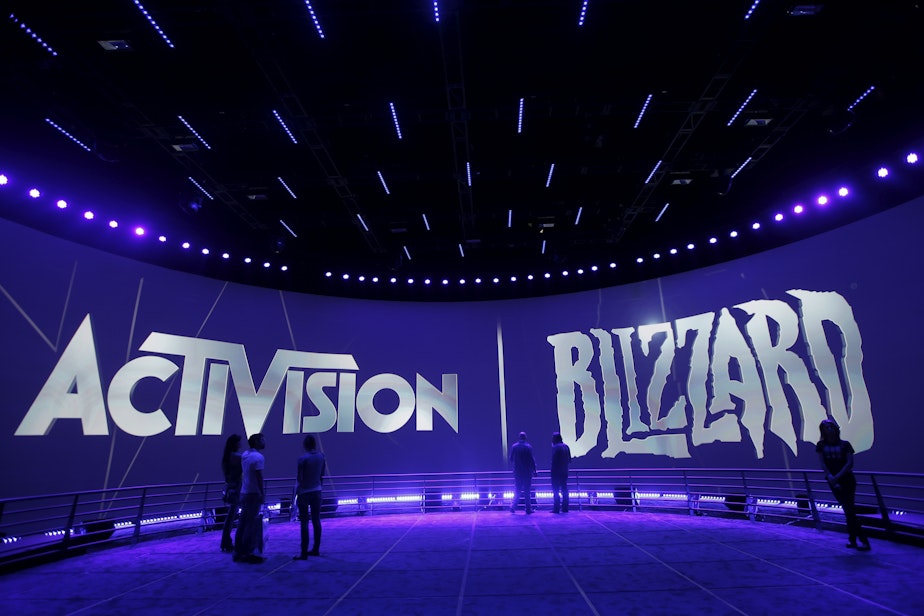Seattle's tech job landscape is evolving: Today So Far

- We all knew it was coming. Immediately after Washington's assault weapons ban became law, a lawsuit was filed.
- Tech workers around Seattle are finding employment elsewhere as large companies continue to announce layoffs. But there is some nuance amid the numbers.
This post originally appeared in KUOW's Today So Far newsletter for April 26, 2023.
You may have noticed a lot of tech companies have been shedding workers nationally, and in the Seattle area. That trend is not looking to ease up anytime soon.
"I think it's quite possible there are more to come," UW Policy Professor Jacob Vigdor told Seattle Now this morning. "I think that there are quite a few tech companies that are kind of having a reckoning right now. We are coming out of an era that was marked, among other things, by low inflation and low interest rates. That made it easy for companies to expand rapidly. Interest rates are much higher now, inflation is higher, and now companies are finding it harder to finance expansions. They are having to go back and rethink a lot of the areas where they are doing business and that process, I don't think is complete yet."
RELATED: Amazon cuts 9,000 workers in latest round of layoffs
The resulting impact on the local economy has been mixed. As KUOW's Kim Malcolm reports, King County's unemployment is among the lowest in the nation at 2.5%. Professor Vigdor notes that despite the many tech layoffs locally, "a lot of those workers are actually managing to find employment without too much effort."
Of course, there is some nuance amid these numbers. Tech workers may find that the job scene won't be quite the same as it ever was. The glory days of working in an office lounge, sipping whatever free drink was in the company stocked employee fridge, may or may not come back. And then there is the pay to consider.
For example, Vigdor points to a friend he knows who was laid off. That person ended up going to work for Alaska Airlines, which would not traditionally be thought of as a tech company. Yet, the company does have tech needs.
Sponsored
UX researcher Naomi Johnson is one such tech worker who was recently laid off in Seattle. Johnson is taking time to find a job that is the right fit, but is also finding that appropriate next step is difficult.
"I would definitely say there are a lot of openings, but a lot of them, I'm not familiar with the company they are at, I'm not familiar with the field they are in," Johnson said. "I'm really grateful that Washington state now has most of these listings have a salary range on them. I'm looking at the numbers and I'm realizing there is no way I am going to be anywhere close to the salary I had previously. I'm looking at a minimum of a 25% pay cut for sure, and I wouldn't be shocked if I ended up taking a 50% pay cut."
Get the full story on today's Seattle Now.
We all knew this was coming ... because I wrote about it on Monday when I said that gun rights organizations were locking and loading lawsuits aimed at challenging Washington's new assault weapons ban.
It didn't take long for those groups to pull the trigger on those lawsuits. And bad news: I have run out of gun puns, yet this issue is likely to stretch on for months as the lawsuit works its way through the legal system.
Sponsored
Within hours of Gov. Jay Inslee signing the assault weapons ban into law yesterday, the Bellevue-based Second Amendment Foundation filed a lawsuit in U.S. District Court for the Western District of Washington. Gov. Inslee previously told KUOW that the state's assault weapons ban "should survive" legal challenges, because "this is a very common sense measure." The parties filing the lawsuit argue otherwise. The Second Amendment Foundation is among them.
While acknowledging that some people have used such weapons for "horrible purposes,” the Second Amendment Foundation's Dave Workman told KUOW that many of the firearms outlined in Washington's ban are not what many people would consider "assault" weapons. He also argues that Washingtonians have a constitutional right to own such weapons.
“Some people use them to hunt small game," Workman said. "There are people who hunt coyotes with them all year long.”
Like I said above, the assault weapons issue is likely to linger from here. The lawsuit asks the court for preliminary and permanent injunctions on the ban, meaning that Washington would not be able to enforce it while the case continues.
The lawsuit cites the Second Amendment, which is the firearm amendment we hear so much about. It also cites the 14th Amendment, which is where we get the "equal protection clause." Expect plaintiffs to argue that Washington state inaccurately titled the guns as "assault weapons" and mischaracterized them as "weapons of war."
Sponsored
“As we note in our complaint, the firearms that Washington bans as ‘assault weapons’ are, in all respects, ordinary semiautomatic rifles," SAF Executive Director Adam Kraut said in a statement. "To the extent they are different from other semiautomatic rifles, their distinguishing features make them safer and easier to use. But even if they are considered as a separate group of ‘assault weapons,’ they cannot be banned because they are not dangerous and unusual."
SAF is not alone in its legal fight. A range of gun rights groups and private parties are filing the lawsuit with them, including Sporting Systems, a gun store in Vancouver, and the Firearms Policy Coalition (based in Sacramento, Calif.). Also, three private citizens: Brett Bass (Snohomish County), Douglas Mitchell (Kittitas County), and Lawrence Hartford (Kitsap County). Seattle attorney Joel Ard is representing the group. The lawsuit names Attorney General Bob Ferguson, along with a range of law enforcement chiefs and sheriffs, and prosecutors as defendants.
AG Ferguson expected the legal challenge. When Gov. Inslee signed the ban into law yesterday, Ferguson noted that the bill was built with the idea that it would have to be defended in court.
"We spent a lot of time carefully crafting the legislation being mindful of the U.S. Supreme Court and recent rulings of the U.S. Supreme Court, and doing everything we could to craft a piece of legislation that we thought could best withstand the inevitable legal challenge," Ferguson said.
Read the full story on the lawsuit here.
Sponsored
AS SEEN ON KUOW

May and Louie Praseuth of the Good Foot Arts Collective participate in a Move-A-Thon for the Southeast Seattle Schools Fundraising Alliance at Aki Kurose Middle School on March 10, 2023. The alliance partners with community organizations like Good Foot to raise funds for schools throughout District 7 in Southeast Seattle. The Southeast Seattle Schools Fundraising Alliance has developed a different way to raise PTA money, and in turn, fund local education. Money is spread across many schools, instead of wealthier schools raising more money, and low-income schools raising little. (Courtesy of Southeast Seattle Schools Fundraising Alliance)
DID YOU KNOW?
Whenever news stories come around about guns, especially assault weapons, the conversation usually goes like this.
Sponsored
Person A: We need to do something about shootings and should do something about assault weapons.
Person B: So called "assault weapons" aren't a thing, and you don't know what you're talking about, and unless you can define "muzzle velocity" to me right now then your opinion doesn't matter.
Let's dig into some of these details by going into the history of the AR-15, the gun you hear a lot about when this issue pops up. A person might assume that "AR" stands for "assault rifle," however, it actually stands for "ArmaLite," the company that invented the model back in the 1950s. It was designed to be lightweight while carrying more rounds. In the 1960s, amid the Vietnam War era, this model was converted into the M16 rifle for the U.S. military. Rambo fans out there will recognize this version. Military branches used this rifle for a few decades after that. It evolved into the modern M4 carbine (carbine = short barrel) that the military uses today. While firearm aficionados can debate the differences, all these rifles are related and have been, and are, widely used by military branches across the globe.
The original ArmaLite company ended in the 1980s, but versions of the AR-15 model are still produced. This is where the civilian models come from. They are not exactly the same as the versions the military, or Rambo, uses. The thing to understand about these versions is that they are semi-automatic. They don't shoot rapidfire, like a machine gun. They are also "modular" firearms. That means the gun can be modified. If you don't like the barrel, you can replace it with a new one. Don't like the buttstock, pistol grip, etc., you can change those out too. You end up with a metal/plastic rifle that fits the image that the term "assault rifle" generally brings to mind. They appear a lot like the photos you see in all of KUOW's reporting on this issue. Yet, because of this, their properties can vary widely. Which is perhaps why people debate what "assault weapon" means so much.
And in case you're curious, "muzzle velocity" just means the speed a bullet is traveling as it leaves the barrel.
ALSO ON OUR MINDS

The U.K. blocks Microsoft's $69 billion deal to buy game giant Activision Blizzard
British regulators on Wednesday blocked Microsoft's $69 billion purchase of video game maker Activision Blizzard, thwarting the biggest tech deal in history over worries that it would stifle competition in the fast-growing cloud gaming market.

